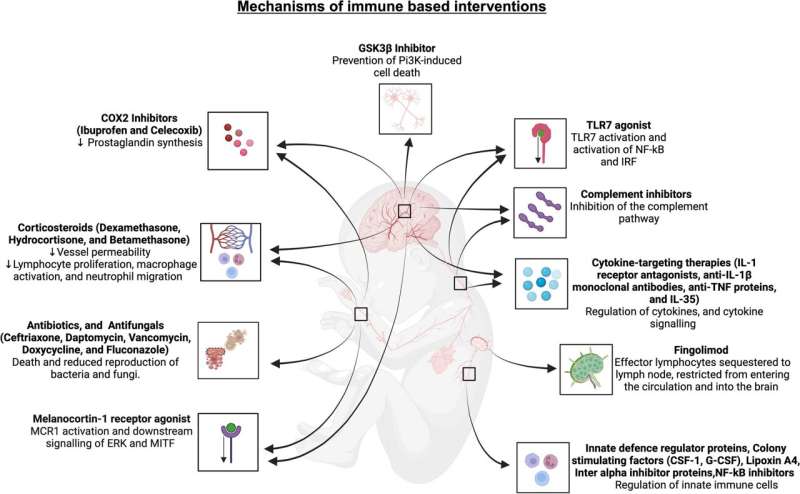This article has been reviewed according to Science X's editorial process and policies. Editors have highlighted the following attributes while ensuring the content's credibility:
fact-checked
peer-reviewed publication
trusted source
proofread
Study finds early anti-inflammatory treatment is best protection for the newborn brain

A major systematic review of treatments for protecting the newborn brain from the negative effects of inflammation has found that earlier anti-inflammatory intervention is best, but it's better late than never.
In essence, the review, published in the Journal of Neuroinflammation, showed that the earlier inflammation is identified and treated in newborns, the better the outcome, but treatment at any stage is better than no treatment.
Inflammation in the newborn brain
Neuroinflammation can have a wide range of effects on the newborn brain, including:
- Disruption of normal brain development
- Damage to brain cells and tissues
- Impaired communication between brain cells
- Alterations in brain structure and function
- Increased risk of neurological disorders, such as autism and schizophrenia.
Perinatal infection/inflammation is associated with a high risk for neurological injury and neurodevelopmental impairment after birth, so Hudson Institute Ph.D. candidate, Sharmony Kelly reviewed the last 10 years of research in the field to establish which treatments have the greatest protection.
Why the newborn brain needs protection
"We know that inflammation can cause a wide range of health problems in newborn babies," she said. "Everything from cerebral palsy and other developmental conditions affecting growth, movement, vision and hearing, to problems affecting the gut such as necrotizing enterocolitis (NEC).
"Despite a growing preclinical evidence base, targeted anti-inflammatory interventions have not been established in clinical practice, partly because of the range of potential targets.
"This was more than just a review; it involved re-analyzing ten years of pre-clinical data and assessing changes in immune-based treatments that have shown promise for being translated into clinical trials."
Sharmony's supervisor, Dr. Rob Galinsky, called the research an important contribution to the field of newborn brain protection research.
Shielding the newborn brain
"One of the biggest threats to the developing brain is inflammation," Galinsky said.
"Inflammation is the body's natural response to injury or infection, but when there is too much unbridled inflammation in the brain, it can have devastating consequences.
"This study asked 'what are the knowledge gaps in the field and how can we solve them, to protect the newborn brain?'
"We therefore systematically reviewed preclinical studies of immunomodulation treatments to improve neurological outcomes in the perinatal brain and assessed their therapeutic potential."
Kelly said, "One of the significant take-aways from this review is that it solidified my approach to targeting cytokines and their role in the inflammatory and injury process in protecting the newborn brain."
What are cytokines?
Cytokines are small proteins that are crucial in controlling the growth and activity of other immune system cells and blood cells. When released, they signal the immune system to do its job. Cytokines affect the growth of all blood cells and other cells that help the body's immune and inflammation responses.
What does perinatal mean?
The perinatal period, which includes pregnancy and the first month after birth, is a critical time for brain development. During this time, the brain is highly vulnerable to damage and disruption, which can have long-lasting effects on a child's cognitive and behavioral development.
Neuroinflammation and its effects on the developing brain
Neuroinflammation is a type of inflammation that occurs in the brain. It is characterized by the activation of immune cells, and the release of inflammatory molecules, such as cytokines and chemokines. Inflammation in the brain can also have long-lasting effects, as it can alter the brain's development and increase the risk of cognitive and behavioral problems later in life.
Perinatal brain inflammation
Perinatal brain inflammation occurs during the perinatal period. It can be triggered by a variety of factors, including maternal infection, fetal infection, oxygen deprivation and exposure to toxins. Perinatal brain inflammation can have serious consequences for the developing brain. Inflammation during this critical period can disrupt normal brain development and increase the risk of neurological disorders later in life.
Causes of perinatal brain inflammation
There are several potential causes of perinatal brain inflammation, including:
- Maternal infection: Infection in the mother during pregnancy can trigger an inflammatory response in the placenta and fetal brain.
- Fetal infection: Infection in the fetus can directly cause inflammation in the developing brain.
- Exposure to toxins: Exposure to toxins, such as alcohol and drugs, can cause inflammation in the developing brain.
- Complications during birth: Complications during birth, such as oxygen deprivation, can lead to inflammation in the newborn's brain.
Effects of perinatal brain inflammation
Perinatal brain inflammation can have a wide range of effects on the developing brain, including:
- Disruption of normal brain development: Inflammation can interfere with the formation and organization of brain cells and circuits, leading to long-term changes in brain structure and function.
- Damage to brain cells and tissues: Inflammation can cause damage to brain cells and tissues, which can impair brain function and increase the risk of neurological disorders.
- Impaired communication between brain cells: Inflammation can disrupt communication between brain cells, which is essential for brain function.
- Alterations in brain structure and function: Inflammation can alter the structure and function of the brain, leading to changes in behavior, cognition, and emotion.
- Increased risk of neurological disorders: Perinatal brain inflammation has been linked to an increased risk of neurological disorders, such as autism, schizophrenia, and cerebral palsy.
More information: Sharmony B. Kelly et al, A systematic review of immune-based interventions for perinatal neuroprotection: closing the gap between animal studies and human trials, Journal of Neuroinflammation (2023). DOI: 10.1186/s12974-023-02911-w



















